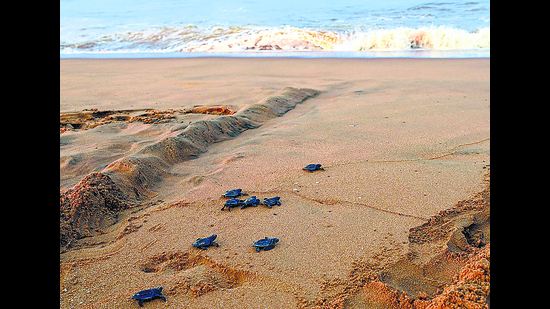A 16-year study on Olive Ridley turtles found that the turtles in the Indian Ocean are among the oldest in the world. The research, titled “Monitoring Sea Turtles in India 2008-2024,” was done by the Wildlife Institute of India and the Centre for Cellular and Molecular Biology. It was published by the Indian Institute of Science and DakShin Foundation in Bengaluru.
Olive Ridley turtles are the smallest sea turtles, and they lay their eggs on the beaches of Rushikulya and Gahirmatha in Odisha. Last month, over 1.3 million Olive Ridley turtles came to the Rushikulya beach to lay eggs, breaking the previous record of 1.15 million.
The scientists involved in the research looked at the genetics of sea turtles along India’s coast and its nearby islands. They discovered that the turtles in the Indian Ocean, especially along the eastern coast of India, are the most ancient Olive Ridley populations. In contrast, populations in the Atlantic and Pacific Oceans likely moved there only hundreds of thousands of years ago.
Before this study, many believed that when the Isthmus of Panama formed 3 million years ago, it divided Olive Ridley turtles into two groups: one in the Atlantic and one in the Pacific. But this new research shows that the oldest turtles are actually in the Indian Ocean. It implies that these turtles survived a global climate change event 3-4 million years ago before populations eventually moved back to the Atlantic and Pacific oceans.
The study also mentioned that as the Earth’s temperature rises, sea turtle populations could become more female-dominated. Researchers have been monitoring the temperatures of nests and the sex of hatchlings at Rushikulya, which is the largest nesting ground in India. They found that about 71% of the hatchlings are female.
However, researchers are still trying to understand why mass nesting (called arribada) doesn’t happen every year. They need more data over 15-20 years to see if there is a pattern. The reasons behind the triggering of these mass nesting events are still a mystery.





Leave a Reply